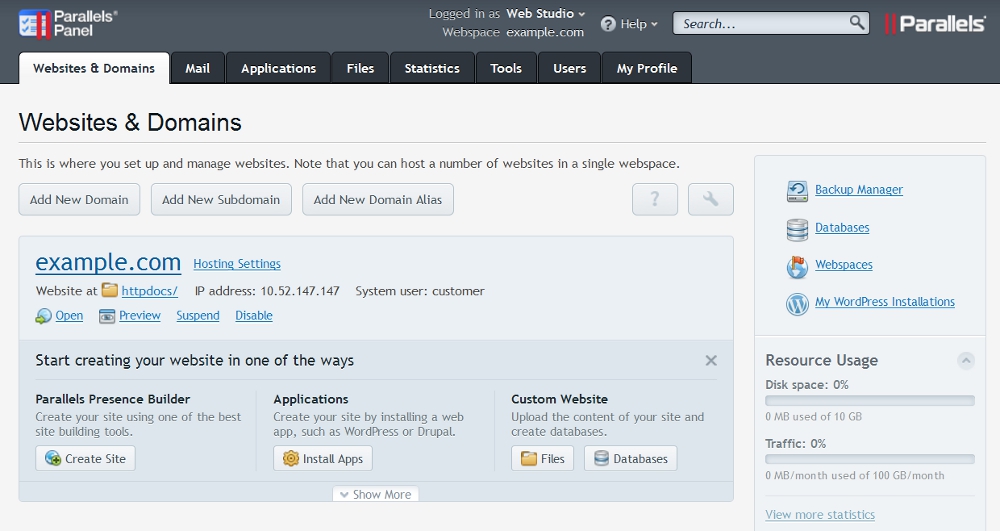We do not have shared Plesk window hosting at this time. If you do need Plesk Window Hosting, please go to our Please Window VPS Hosting or Dedicated Hosting
- World-class data centers
- Best-of-Breed routers, firewalls and servers
- FREE email addresses
- 99.9% uptime guarantee
- One-click install of free applications
- Unlimited Monthly Bandwidth
- Flexible, easy to use control panel (cPanel or Plesk)
- 1 GB storage MySQL linux databases
- NO hidden fees
- 24/7 security monitoring and DDoS protection
- All Web hosting accounts are placed in our cloud servers.
- 24/7 Phone/Email Support
The Plesk Window control panel includes:
General Features
Domains
|
Language Support
Email Features
Databases
|
Powerful hosting made easy
With its user-friendly control panels featuring cPanel®, our Hosting puts you in charge. And thanks to our award-winning data centers, lightning-fast load times and 24/7 monitoring, you know your site will always be safe, secure and online – guaranteed*.
Award-winning security keeps your site safe
Keeping a website secure is a full time job. That’s why our security team is on the job 24/7, monitoring your site for suspicious activity and protecting it against brute force and DDoS attacks.
What is Web Hosting?
Make sure friends, family and customers can see your website.
Hosting is what makes it possible for others to view your website over the Internet. Without it, you’re the only one who will ever get a look. POWERHOSTER.COM serves up…
- One-click set-up
- Unlimited storage and bandwidth
- Scalability to fit your needs
- 24/7 secure monitoring
We use industry-standard control panels giving you the flexibility to choose the platform that works best for your needs. Choose from cPanel for Linux or Parallels Plesk for Windows. If you plan on using a Web application to blog, podcast, or create a shopping cart and you are working with a designer or developer to build your site, check to see what operating system the application needs (Linux or Windows) or what software language will be used, before purchasing your hosting account.
Web hosting refers to the service that allows individuals and organizations to make their websites accessible on the internet. In simple terms, web hosting is the process of storing and making web content (such as text, images, videos, and other files) available to users through the World Wide Web.
Here’s a breakdown of how web hosting works:
- Website Files Storage: When you create a website, you generate various files such as HTML documents, images, videos, and other resources. These files need to be stored on a server, which is a powerful computer designed to store and deliver web content.
- Server: A server is a computer that is connected to the internet and is specially configured to handle requests from web browsers. It stores the website files and serves them to users when they access the website.
- Domain Name: In order for users to access your website, they need to know its address. This address is known as a domain name (e.g., www.example.com). Domain names are linked to specific IP addresses, which identify the server where the website files are hosted.
- Domain Name System (DNS): The DNS is a system that translates human-readable domain names into IP addresses that computers understand. When a user types a domain name into their web browser, the DNS system directs the browser to the correct server hosting the website.
- Web Hosting Provider: Web hosting services are typically provided by specialized companies known as web hosting providers. These companies offer various hosting plans that vary in terms of server resources, features, and pricing.
Parallels Plesk for Windows
Each Windows plan includes:
- Parallels Plesk Panel: Easily manage your server, email accounts and more with this popular, award-winning control panel.

- Windows Server 2012: Take control of your hosting with Microsoft’s newest and most powerful server operating system.
- Free Applications: Instantly install over 70 applications on your website with just a few clicks.
Choose Windows if you’re going to use APS or ASP.NET. Our Windows hosting customers typically use a SQL Server (MS SQL).
Parallels Plesk includes automation tools specifically aimed at ‘cloud web hosting’ providers, and the wider Parallels product range includes more advanced tools for server virtualization (for the creation of private clouds).
No need to install multiple components. Plesk ships with one single component, providing role based access – from end user, to developer, to back-end admin, across all devices.
 |
 |
 |
What is Window Web Hosting ?
Windows Specific Applications
Windows applications which require a Windows server:
- ASP Classic
- ASP.NET
- MSSQL (Microsoft SQL Server)
- MS Access (Microsoft Access)
- Visual Basic Development
- C#
- Remote Desktop (dedicated server only)
Windows Dedicated Servers can support additional Windows-specific applications. For some applications, you may need to purchase a license and install the software on your Windows dedicated server.
- Microsoft Exchange (requires license & Installation)
- Microsoft SharePoint (requires license & Installation)
What is Plesk Web Hosting?
Plesk Web Hosting refers to web hosting services that utilize the Plesk control panel. Plesk is a web hosting control panel that provides a graphical interface and a suite of tools to simplify the management of web hosting accounts and server administration. It is designed to make it easier for users to deploy, manage, and scale web applications and websites.
Key features of Plesk Web Hosting include:
- User-Friendly Interface: Plesk offers a user-friendly interface that allows users to manage various aspects of their hosting environment without the need for advanced technical knowledge. The interface is designed to be intuitive and accessible.
- Multi-Platform Support: Plesk is known for its versatility in supporting both Linux and Windows hosting environments. This flexibility makes it suitable for a wide range of users with different hosting preferences and requirements.
- Website Management: Users can easily manage their websites, domains, and subdomains through Plesk. This includes tasks such as uploading files, configuring DNS settings, and managing databases.
- Email Management: Plesk provides tools for setting up and managing email accounts associated with hosted domains. Users can configure email settings, create mailboxes, and implement spam filtering.
- Security Features: Plesk includes security features such as SSL/TLS certificate management, firewall configuration, and the ability to set security policies. These features help enhance the overall security of the hosting environment.
- Application Deployment: Plesk simplifies the deployment of web applications and content management systems (CMS) by offering one-click installations for popular applications like WordPress, Joomla, and Drupal.
- Extensions and Add-ons: Plesk supports extensions and add-ons that allow users to extend the functionality of their hosting environment. These extensions can include additional features, tools, and integrations.
- Server Administration: For server administrators, Plesk provides tools for server-level management, allowing them to configure server settings, monitor performance, and handle system updates.
- Backup and Restore: Plesk typically includes backup and restore functionality, allowing users to create backups of their websites and server configurations. This can be essential for disaster recovery and data protection.
Plesk is often used by hosting providers to offer a user-friendly hosting experience to their customers. It is suitable for a range of users, from individual website owners to businesses with more complex hosting needs. Plesk Web Hosting services may come with different plans and pricing structures, depending on factors such as the number of domains, storage space, and additional features offered by the hosting provider.
All Plesk Hosting Plans Include:
The Plesk control panel is designed to help you manage all of the features of your account in the fastest, easiest and most efficient manner possible!
- World-class data centers
- Best-of-Breed routers, firewalls and servers
- FREE email addresses
- 99.9% uptime guarantee
- One-click install of free applications
- Unlimited Monthly Bandwidth
- Flexible, easy to use Plesk control panel
- 1 GB storage MySQL linux databases
- NO hidden fees
- 24/7 security monitoring and DDoS protection
For more plesk hosting information, you can check our plesk window web hosting
The Difference Between Plesk Hosting and cPanel Hosting ?
Plesk and cPanel are both popular web hosting control panels that provide users with a graphical interface and tools to manage their web hosting accounts. While they share similar functionalities, there are some differences between Plesk and cPanel:
- User Interface:
- cPanel: Known for its clean and user-friendly interface, cPanel uses a more traditional layout with icons and sections that are easy to navigate. It’s designed with simplicity in mind.
- Plesk: Plesk also has a user-friendly interface, but it often has a more modern and visually appealing design. Plesk’s interface may be considered more polished and streamlined by some users.
- Operating System Compatibility:
- cPanel: Historically, cPanel has been associated with Linux hosting environments. Although cPanel now supports some Windows servers, it is more commonly found on Linux-based hosting.
- Plesk: Plesk is known for supporting both Linux and Windows hosting environments. This makes it a versatile choice for users who need hosting on either operating system.
- Feature Set:
- cPanel: cPanel has a wide range of features that cover all aspects of web hosting management, including website and domain management, email setup, file management, security settings, and more.
- Plesk: Plesk offers a comprehensive set of features similar to cPanel. It includes tools for website management, domain configuration, email setup, security features, and additional extensions.
- Customization and Extensions:
- cPanel: cPanel has a large number of third-party plugins and extensions available through the cPanel App Catalog, allowing users to extend its functionality.
- Plesk: Plesk also supports extensions and additional components, and users can access the Plesk Extension Catalog to add extra features.
- Security Features:
- cPanel: cPanel provides security features like SSL/TLS management, IP blocking, and security policies to enhance the overall security of the hosting environment.
- Plesk: Plesk also offers security features, including SSL/TLS management, firewall settings, and security measures to protect against common threats.
- Server Resource Usage:
- cPanel: Some users suggest that cPanel may use slightly more server resources compared to Plesk, but the difference is often negligible and depends on specific server configurations.
- Cost:
- cPanel: The pricing structure for cPanel is usually based on a per-account or per-server model, with hosting providers paying a license fee. End-users typically don’t directly pay for cPanel.
- Plesk: Plesk also has a licensing model, and the cost may vary based on the edition (Web Admin, Web Pro, or Web Host) and the number of domains.
Ultimately, the choice between Plesk and cPanel may come down to personal preference, the specific needs of the hosting environment, and the hosting provider’s offerings. Both control panels are capable of effectively managing web hosting tasks.




